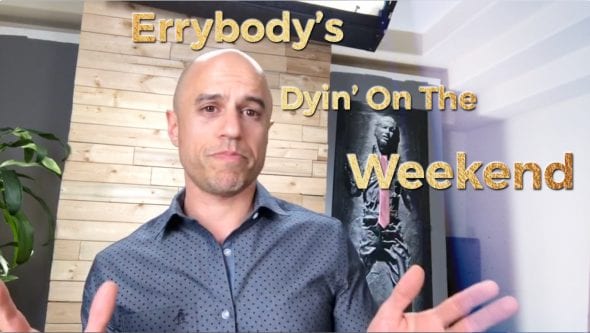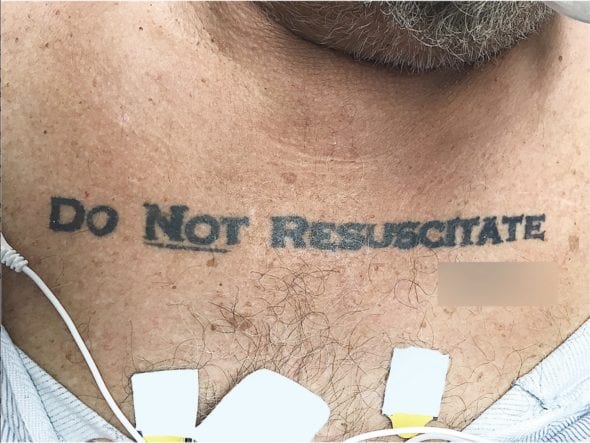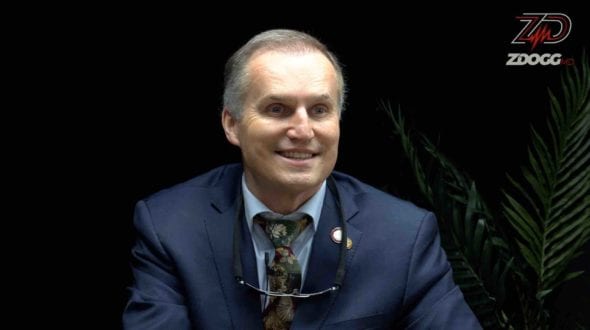There’s a good chance this pandemic can be transformed into an endemic common cold, safely and relatively quickly. Here’s some science.
– [Zubin] Hey, Dr. Z, so people have been freaking out, because the vaccines don’t seem to prevent reinfections sometimes. And they’re thinking the pandemic’s just gonna go on forever, especially when we’re back with masks, and some countries have lockdowns, and oh my God, what happened to Iceland, and what’s going on in Israel?
All right, first of all, take a breath. Second of all, let’s do some science on this, because it turns out it’s very likely, which is something we’ve been saying from the beginning, that this pandemic with SARS-CoV-2 is ultimately going to turn into an endemic, meaning a virus that just lives with us as seasonal, and is no different than the common cold in the severity of disease it causes. So let’s go through why this may happen, and why these vaccines not being perfect at preventing infection may actually be a good thing at expediting this, and getting us off vaccine dependency in the future.
So there’s an article in “Science” that I’m gonna link to that came out in February, where they modeled this out. Remember, there are like four endemic human coronaviruses that cause common cold type symptoms around the world in a seasonal fashion. So those have been with us for who knows how many hundreds, or thousands of years. Then we have three kind of new school coronaviruses, SARS-CoV-1, the OG, MERS, Middle Eastern Respiratory Syndrome coronavirus, which by the way, is there a double standard here? We can’t call it the China virus, but we can call it the Middle Eastern Respiratory Syndrome. Pick who you wanna be racist against, and just be racist against everyone, or be racist against no one. And as a Middle Eastern person who’s married to a Chinese woman, we agree you can’t just hate one of us. You gotta hate both of us.
All right, that being said, Middle Eastern Respiratory Syndrome, and then SARS-CoV-2, the sequel So those three new ones are interesting, because MERS and SARS-CoV-1 never achieved pandemic status, because they created infectivity only when you were contagious, when you were having symptoms. So it was easy to contain, easier to contain, because you could just identify people with symptoms. If they have fevers, they’re coughing, all that, you just isolate them, test them, et cetera. CoV-2 was different, because it could infect people when you’re asymptomatic, and that’s why control and containment of it became pretty much impossible after it got out of the bag, all right? So you have these viruses. Well, they looked back, and said, “Well, okay, what’s going on “with the original four coronaviruses that live with us “that are our, you know, kind of our annoying homies “in the winter?”
And they found something interesting. When you look at antibody studies in the human population on those viruses, against those viruses, there are two types of antibodies, I’m simplifying it, that we generally produce for this kind of thing. One is IgM, which is a short, like it happens when you’re first infected, and you mount this immediate response, and then IgG, which is a long, it takes longer to produce, and then it’s the antibody that you often mount when you’re mounting a memory response, or you’re reinfected, that kind of thing, and this is what they found. IgM positivity really only happened in kids.
So pretty much every kid up until age 15 at some point gets infected with these endemic coronaviruses, mount an IgM response that then evolves into an IgG response. After 15, there was almost no IgM response. Everybody had IgG, but they would still get infected over time. But they would mount this memory IgG response, and what the authors describe is, well, it just shows that basically kids get infected by the endemic virus, and they generate immunity that then persists into adulthood, but that immunity does not prevent reinfection. And they said there are three aspects of immunity that you ought to think about when you’re talking about how does a virus go from pandemic to endemic, and can it do that, and the three are this. One is immune resistance to infection in the first place. So how susceptible are you, and how much does your immunity help you?
Well, it turns out with measles, when you get infected with measles, or vaccinated against measles, because they’re really kind of the same thing, you, and so, that’s why natural infection gives you really good hints as to what a vaccine’s gonna do, all right? So when you’re naturally infected with measles, or vaccinated, you get sterilizing immunity. You are no longer susceptible to infection, and that has to do with measles’ long incubation period, and the fact that it has to enter bloodstream in order to cause its big disease, and if you have antibodies, they live in the bloodstream generally, you’re gonna do, you’re gonna really prevent it from even infecting you. So that kind of thing is that’s one example of susceptibility being very extreme.
But the second is SARS-CoV-2. So SARS-CoV-2 and the endemic cold viruses, it turns out, when you’re infected, you generate some immunity, and the same goes with a vaccine, but it wanes over time, so that you can get reinfected. So your susceptibility to reinfection is not perfect, and it wanes over time. Well, we see that with natural coronavirus infection, and we see it with the vaccines, Pfizer waning more than Moderna, Moderna maybe had a higher dose, maybe a little bit more dose spacing. Who knows why, right? But the bottom line is they both wane over time in terms of getting reinfected. So that’s one aspect, and it turns out the endemic coronaviruses are probably the same thing. But then what’s the second aspect of immune protection? Well, protection against severe disease. So with SARS-CoV-2, it looks like susceptibility, protection against susceptibility wanes fast. Protection against severe disease does not seem to wane quickly.
So looking at Moderna and Pfizer, they both still protect against severe disease even months out. And natural infection probably does the same thing. They may be slightly different degrees, right? And there may be some people that are more susceptible, people with compromised immune systems, older people, that sort of thing, all right? So severe disease is another protect, you know, a feature of the immune protection, and it matters, because those are the people that fill up our hospitals. Those are the people that we care about. Nobody cares about getting a cold, dude. We care about people dying in hospitals on ventilators. We care about filling overflowing hospitals, so we can’t do elective procedures, and prevent cancer with colonoscopy screening, and those kinds of things, right, and mammography. But the third aspect of immune protection is transmissibility. So how much does your immunity prevent you from transmitting?
Well, it’s pretty clear, and the CDC has kind of looked at this, that the vaccines do still allow you, if you’re reinfected, you can still transmit, but what they don’t tell you is how much. So it turns out sure, if you study a rip-roaring reinfection, where they have high viral load, just like an unvaccinated person, they’re a breakthrough case where it just didn’t work that well, they still don’t die, by the way, severe disease, still protected. But they’re gonna transmit just like an unvaccinated person. But the majority of vaccinated and previously infected people, they may still get infected, they may even get symptoms, right? But the duration of their transmissibility is narrowed. They clear the virus faster, and it looks like that’s what happens with endemic coronavirus, our common colds, as well. People clear it faster, which means there’s less transmission overall. All right, so let’s put this together into a picture, SARS-CoV-2, and let’s compare it to MERS, the Middle Eastern Respiratory Syndrome.
So both of them are coronaviruses, and it turns out MERS is more fatal, particularly in young people and old people. So kids and elders are the most at risk for MERS. Now, compare that to SARS, where it’s an age gradient that gets worse as you get older, or you have co-morbidities, like obesity, diabetes, et cetera, risk factors, right? Well, it turns out if you vaccinate against SARS-CoV-2, or you get naturally infected, what’s gonna happen? You’re gonna prevent severe disease, particularly in the most vulnerable people, and then you’re gonna reinfect people naturally, because it doesn’t prevent reinfection, particularly in younger groups that then generate a broader disease protection that turns the virus over some period of time, usually probably years, but it can be sped up by increased transmission, ’cause you need to be re-exposed and re-exposed, or booster re-vaccination, right? And what you do there is it’s actually the perfect scenario, because kids generally don’t die from coronavirus. So as time goes by, you start out, bend the curve early on when you don’t have a vaccine to protect targeted protection against elderly and people at risk. Young people then get naturally infected.
Now, it’s hard to protect elders. This is very controversial. You could then put masks on everyone. You could, you know, shut down essential businesses, do all that. There’s many ways to skin this. But when you get a vaccine, you now have a bypass switch where you get to cheat. And the vaccine’s gonna behave like natural infection in terms of preventing severe disease. So vaccinate everybody starting with people at high risk, and get the jump on turning the thing endemic, because what you’ve done now is you’ve created severe disease immunity, right? Now, it may be that it takes multiple exposures to turn this virus safe long-term. So how are you gonna do that? Well, it turns out since kids are generally much safer what you can do is vaccinate as many people as you can.
Kids and young adults may get naturally infected anyways, but you can also vaccinate as many as you can, and then give boosters to people at the highest risk, like elders, people with immune compromise, people with multiple co-morbidities, or people who are just worried and don’t wanna take the chance, and other people will get naturally reinfected when a variant like Delta emerges that is so contagious that if you haven’t been vaccinated, or naturally infected, as Yoda said, “You will be,” right? It’s going to get you. It’s that contagious. So either you’ve been naturally infected, and you’re probably okay, or you’ve been vaccinated, and you’re probably okay, but vaccinate everybody, but then stop testing people who’ve been vaccinated who are low risk.
It’s going to reinfect people. That’s gonna boost immunity. You can give boosters to people that you’re worried about, and that will speed this transition from pandemic to endemic cold, turn SARS-CoV-2 into a cold, and this is then what happens. Stop vaccinating. Why? Because when you look at the endemic cold viruses we have, everybody’s been infected at some point. Elders are protected from severe disease through multiple reinfections every cold season, or every fourth cold season, whenever they get it. The only new primary infections are in young kids and babies who blow it off, partially because they’re innately, they’re not bothered by it, and it may be lower concentration of ACE receptors, whatever it is, but also they have maternal antibodies, the youngest ones do from mom, who’s been, you know, in a world where this thing is endemic, and she’s got antibodies against it, so the kids don’t get, the babies don’t get severe disease. And you can stop vaccinating, because you don’t need to.
There’s auto-vaccination with the seasonal cold, and by vaccinating people and they still get reinfected, you’re not even preventing the cold. That’s why we don’t have a vaccine against the common cold, honestly. So that’s perfect. That’s awesome. Stop panicking. It’s going to be okay, right? But we have to get through this phase, where people are at risk. That means get vaccinated. Get vaccinated. Boost for people who are at higher risk, and everybody else, we ought to be reducing restrictions, and letting this transition to pandemic now, endemic. Now, the question is when do you do that? And that’s up to debate, because people are still at risk, but you have to weigh costs and benefit. Are we driving our children crazy? Are we creating mental illness? Are we hurting the economy? Are we harming poor people? These are all the things we’ve been talking about over the entire pandemic. Now, contrast this to something like MERS, MERS kills kids. It’s got a high fatality rate.
If MERS became a pandemic, you would treat it very differently. You would lock down early, protect as many people as you can, mask everybody, be very cautious, aggressively work on a vaccine. At that point, you would vaccinate everybody, including little babies. And then, since if it ever became endemic what would happen is the only new infections would be young kids who could die, at that point, it becomes a childhood vaccination for every child. And that produces enough immunity that then reinfections don’t kill you, all right, if that’s how MERS behaved. So it’s a different virus. You see how these dynamics of susceptibility, severe disease, and transmissibility will, and who it kills will modify how you think about a pandemic. So this is really good news. Here’s the punchline. The early part of the pandemic is over. Vaccinate everybody who can be vaccinated. If you’ve been previously infected, if you wanna get a jump on that sort of extra immunity against severe disease, you can get a vaccine.
And then, we should boost for people that are at high risk, and anyone else who wants a booster. You wanna get a vaccine booster? Get a vaccine booster. It’s just that little extra, right? Maybe you’re one of those people who has diabetes, hypertension, kidney disease, and you’re at higher risk for breakthrough infection and severe disease, right? Now, I mentioned Iceland in the beginning. People are, anti-vaxxers are using Iceland as an example of look, the vaccines don’t work, right? Iceland did a great job early in the pandemic. I did a video about this. They scienced the crap out of it. They genotyped everybody, they tested everybody, they have a small population, integrated healthcare, all of that, and this high-tech kind of approach to it, and it worked really well, and they didn’t have to do a very aggressive lockdown. Well, now they are seeing Delta. But Delta, and this gets to this, Delta in the setting of a 70 to 80% vaccination rate in that country.
All right. Well, the classic herd immunity is tough to get when you can get reinfected, but you can start to achieve a herd immunity effect against severe disease. So what we’re seeing is cases at the highest rate they’ve ever been in the pandemic in Iceland, why? Because they opened up. They went to England. They watched the soccer matches. They come back. The mask requirements were gone. So that sort of mitigation stuff happened, you know, stopped, but they’re vaccinated, so what’s happening? Well, their hospitals get busier, because some breakthroughs will lead to some disease that requires hospitalization, but their deaths are like hardly anything.
Their severe disease is very, very low, and they have a jumpstart on endemicity, turning this thing into the common cold. So we have a real-world case example of this. Now, the thing is it may take a little while. It may take multiple re-exposures, which is why a mix of boosters and natural infection, Delta may be a blessing to people who are vaccinated, because it’s gonna quickly make this thing endemic. But to people who are unvaccinated, you are pretty much screwed. So just get vaccinated, all right? Love you guys so much. If you want to do live back and forth discussions, where we kind of dive into these topics, usually before I do a show like this, so we can really hash it out, come join us.
My favorite platform is Locals. Just go to zdoggmd.locals.com. But Facebook has a great supporter tribe as well as does YouTube. So any of those platforms that you like, you can go to zdoggmd.com/supporters to see ways to join us. You can also support us with a one-time donation on paypal.me/zdoggmd, and any comment you leave there, I respond personally by email, and that keeps us independent of all the pharma entanglements that you accuse us of. It pays for all this. All right, guys, I love you so much. I will see you very soon, and we out, peace.
Related Videos
Category
- The ZDoggMD Show (797)
- Featured Videos (188)
- Doc Vader (142)
- Against Medical Advice (128)
- Medical Humor (95)
- Public Service Announcements (87)
- Music Parodies (74)
- Nurses (59)
- Meditation (38)
- ZVlogg (36)
- The VPZD Show (31)
- ZTalks (28)
- ZBlogg (24)






